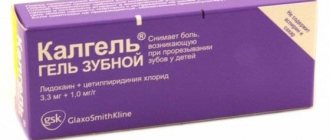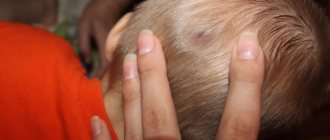Overfeeding
As a rule, when a child is worried and screams, every mother thinks that he is hungry and stops following the feeding schedule . As a result, the baby begins to cry hysterically even more often, and the mother tries to feed him again and again. Thus, the food in the baby’s stomach does not have time to be properly digested, and rotting processes begin, which leads to severe pain in the stomach.
In this case, when a baby has a tummy ache, it is important to know what to do.
It is necessary to feed the baby strictly according to the schedule, observing the correct daily routine.
If the baby is just a little short of the next feeding, you need to distract him with something, and not start feeding him at his first request. The baby's gastrointestinal system is in a state of formation and too frequent breastfeeding puts a strong load on this system, which it cannot cope with.
Reasons for the problem
Often the cause of abdominal pain in a newborn is the condition of the digestive system, which in infants may not yet be fully formed. The digestive organs can also respond with pain to the introduction of new unusual foods into the diet of the baby or mother, when breastfeeding.
The main reasons for the development of abdominal pain in a baby:
- excessive accumulation of gases;
- intestinal colic;
- dysbacteriosis;
- food allergies, especially with the introduction of complementary foods and in bottle-fed babies;
- lactase deficiency, manifested in a lack of lactase enzymes that break down milk sugar;
- teething;
- intestinal obstruction.
At an early age, the baby cannot tell his parents what is causing his anxiety and crying, so young mothers and fathers should know the signs of tummy pain in newborns.
Mom's diet
During pregnancy, the expectant mother followed the doctor's recommendations, and the diet was thoughtful and balanced. After the birth of the child, it is necessary to continue to follow the diet, since improper nutrition of a nursing mother directly causes colic in the child.
Incorrectly selected foods for the mother's diet are the reason that the baby has a tummy ache. What to do in this case?
During the feeding period, you should never eat snacks. Despite the heavy workload and lack of time, you still need to balance your diet and adhere to a certain regime. During this period, all factory-produced semi-finished, salted and smoked products, as well as sweets consisting of a large number of ingredients, are strictly prohibited.
For a mother who is breastfeeding, during this period it is recommended only home cooking from natural products , drinking a lot and preferably separate meals. A pediatrician will help you formulate such a diet.
What to do for constipation in a newborn
Of course, in order to properly treat constipation in a newborn, qualified medical assistance is required. But you can alleviate the baby’s condition on your own. It is enough to have certain knowledge. This statement is shared by the well-known pediatrician Dr. Komarovsky, who advises all mothers in such a situation to give the baby a massage, perform the “bicycle” exercise, take warm baths, eat foods that soften the stool, and place the newborn on the tummy, which will help activate intestinal functions.

Dr. Komarovsky advises eliminating constipation in newborns by consuming fiber, bran, cereals, bread, and a sufficient amount of fresh fruits and vegetables. The best option, in his opinion, is to feed infants with slightly undercooked cereals. Komarovsky also notes in his advice that the food that babies are fed should not be subjected to excessive heat treatment and should not be made too soft.
Before starting treatment for constipation in newborns, the cause of their occurrence should be established by contacting a pediatrician. After all, the development of difficulty in bowel movements can be caused by serious diseases, which only a specialist can help identify. If necessary, he may ask for an x-ray, an ultrasound of internal organs, a blood test for hormones and vitamin content, or a stool test for dysbacteriosis. If the examination results did not show any abnormalities, most likely constipation may be caused by the immaturity of the children’s nervous system, or associated with the quality of breast milk or artificial formula. Treatment of constipation in newborns should be carried out comprehensively and preferably under the supervision of a doctor.
Under no circumstances should you self-medicate or use medications uncontrollably. This way you will not only not relieve your baby of constipation, but will also significantly worsen his situation. Giving enemas to a baby, trying medications at random, using folk remedies and using other dubious manipulations is strictly prohibited. Prescribing medications, making adjustments to diet and other aspects should only be done by a doctor.
Movement and movement again
It is precisely the full-fledged movement that the child lacks. Spending most of the time in a lying position, the baby needs movement with the help of his parents. It’s good to rock a baby in a cradle or stroller, but it’s better to periodically pick him up and take him on “tours” around the apartment.
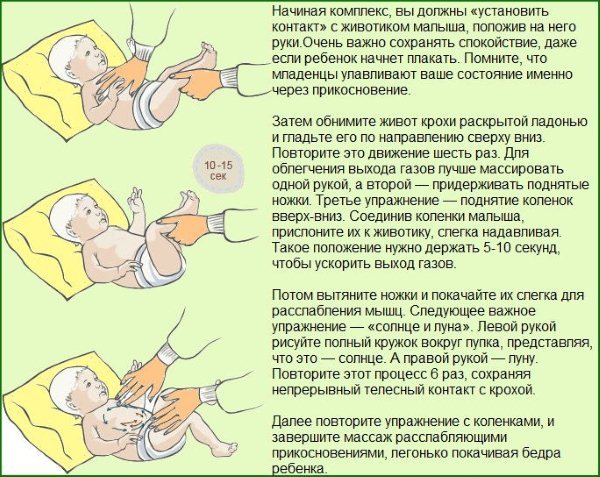
In this case, excess gases will quickly leave the baby’s body, and he will feel much more comfortable.
If your baby often has a tummy ache, what should you do?
You shouldn’t panic right away and start giving your child medications from infancy. Even the best of these drugs are unnecessary chemicals for a fragile child’s body.
Tummy massages and daily special exercises are no worse for intestinal and stomach colic. The local visiting nurse will show you how to correctly do a set of such exercises. a tummy massage a few minutes before feeding . You should stroke your baby's belly in a clockwise direction with gentle circular movements. This helps relieve cramps and makes the gastrointestinal system work harder.
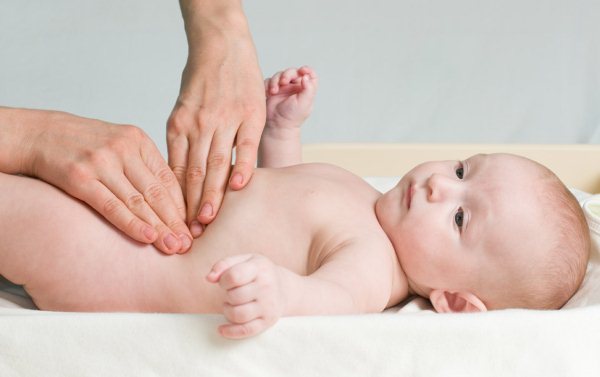
Baby tummy massage
During feeding, you should lift the baby into an upright position several times and give him the opportunity to burp the excess air that enters the body along with the milk. As a rule, the baby sucks most intensely in the first minutes of feeding. Greedily grabbing his mother's breast, it is during this period that he receives the main portion of air. Once the first hunger is satisfied, be sure to give the newborn the opportunity to burp this air.
https://www.youtube.com/watch?v=bpEo0xbgEu0
Very often, it is the mother herself who is to blame for a baby’s tummy pain immediately after feeding. What can you do to help your baby get rid of the air bubbles that cause colic? If you raise the baby after he is completely full, then it becomes very problematic to make sure that all the air that gets in during feeding comes out of the stomach. Therefore, the feeding process should be divided into several stages.
Not every baby will have the most optimal position when he is lifted and pressed to the shoulder, supporting his head. If in this position the child still cannot burp air, you need to look for a more suitable position for him. You can try holding your baby's back to your stomach and lightly stroking his tummy or squeezing his legs slightly. Each mother must find an individual position for her child in which he can get rid of air as quickly and comfortably as possible.
The tummy may begin to hurt even while the baby is sleeping. What causes such sharp colic and what can you try to do? If the baby suddenly wakes up and screams, tucking his legs under him, you can try turning him over onto his stomach and stroking the baby's back in a circular motion. Perhaps in this position the pain will go away and the baby will fall asleep on his stomach. By the way, it is very good when a child gets used to sleeping on his stomach; digestion occurs better in this position.
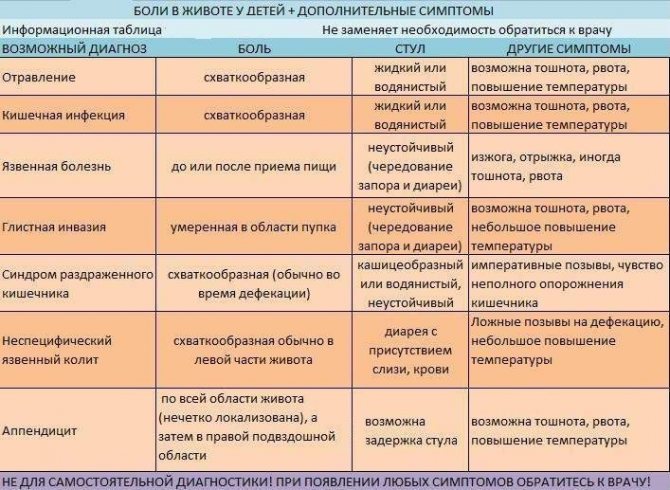
When a baby's tummy hurts - symptoms
If the room where the baby is is warm enough, then you should not dress him too warmly. Several times a day you need to give him the opportunity to lie naked for a couple of minutes. To prevent the child from waking himself up in his sleep, some mothers swaddle his hands. Under no circumstances should you do this with your legs. The lower part of the newborn's body should be completely free.
Preventive measures
To reduce the risk of your baby experiencing pain in the abdomen, it is recommended to follow these simple rules:
- After feeding, hold the baby upright for 5-10 minutes until a burp appears, indicating the release of excess air from the stomach. This will help avoid colic and gas accumulation.
- The baby's mother must carefully monitor her own diet and, when breastfeeding, follow a special diet for at least six months, which will be determined by the doctor. Cabbage, black bread, beets, legumes, tomatoes, and carbonated drinks should be excluded from the diet.
- When artificial feeding, special attention should be paid to choosing baby food that is suitable for the child.
- Before feeding, it is useful to lay the baby on his tummy for a few minutes.
- It is important to avoid long breaks between feedings and to follow the baby's meal schedule.
- Follow the rules of breastfeeding: when sucking, make sure that the baby grasps almost the entire areola, and not just the nipple.
Abdominal pain in newborns is a common problem that requires effective and quick help for the baby. Home treatment is possible in the absence of alarming symptoms only after consultation with a pediatrician. Untimely recognition of signs of serious problems in an infant can lead to a deterioration in the baby’s health and even threaten the life of the newborn.
Assistants
Modern parents can be advised to use various devices for carrying a baby : it can be a kangaroo for newborns, or a sling. These devices not only allow the child to move as much as possible at his age, but also reduce the load on the mother’s arms and spine. By kicking his legs, the baby gets rid of excess gases and air bubbles accumulated in his intestines.
To help her baby survive this difficult stage in his life, each mother must find an individual solution and independently decide what to do if he has a tummy ache.
Find out right now about the most useful drug Plantex for newborns (instructions for use). For colic, constipation, bloating, regurgitation and to normalize digestion.


